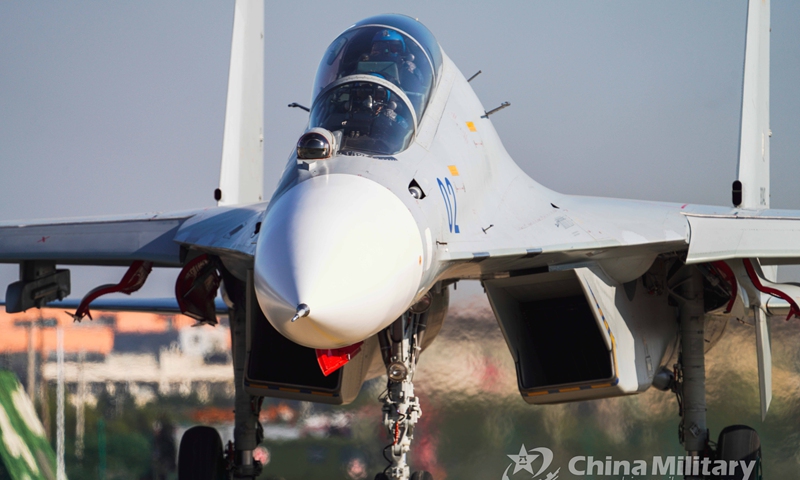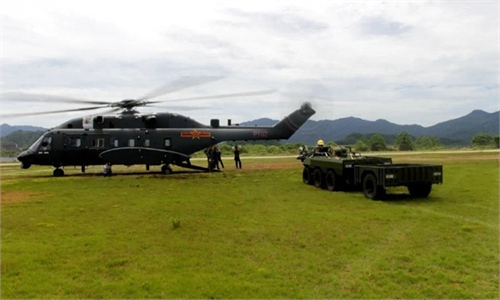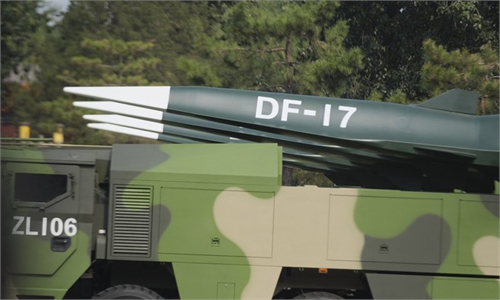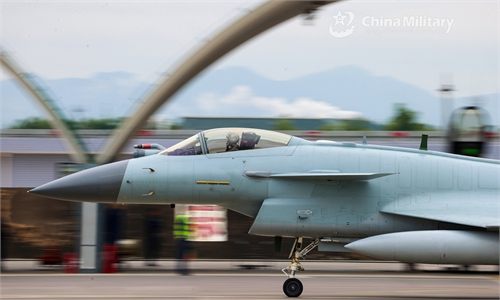Will voyage of US warship through Taiwan Straits cast shadow over China-US ties?
Move to cast shadow on ties, may not impact possible military talks

A Su-30 fighter jet attached to a naval aviation brigade under the PLA Eastern Theater Command taxies to the takeoff point during a recent round-the-clock flight training exercise. (eng.chinamil.com.cn/Photo by Zhao Ningning and Shentu Linhui)
About a week after top Chinese and US leaders exchanged views on fundamental questions concerning China-US relations, the Chinese People's Liberation Army (PLA) on Tuesday had to track and monitor a US warship when it sailed through the Taiwan Straits.Despite the latest transit is separate from potential arrangements for possible China-US military exchanges reported by the media, observers still considered the US move as risky and provocative, which may cast a shadow on bilateral cooperation in other areas like climate change or on rebuilding political trust.
The USS Milius guided missile destroyer on Tuesday sailed through the Taiwan Straits, and the PLA Eastern Theater Command placed naval and air forces on high alert to track and monitor the vessel, Colonel Shi Yi, a spokesperson of the PLA Eastern Theater Command, said in a statement.
Shi said the US move created security risks and harmed regional security. Shi added that the command troops will take every measure necessary to resolutely counter all threats and provocations, and firmly safeguard national sovereignty and territorial integrity.
The voyage of the USS Milius marked the 11th Taiwan Straits transit by US warships in 2021, and also the first after the virtual meeting between Chinese President Xi Jinping and US President Joe Biden last week.
Such a provocative move came after recent reports that officials in Washington and Beijing have agreed to high-level conversations between their militaries as the two sides "are ready for a strategic dialogue on setting up guardrails to manage tensions," which is a positive sign for enhancing military communication between the two sides.
The move might have an impact on areas where China and the US have advanced their cooperation recently, as the Taiwan question remains a fundamental red line of bilateral ties, experts said. But it might not impact the widely expected high-level military communication arrangement, as the arrangement for military-level communication is part of safeguarding "guardrails and bottom lines" to avoid miscalculations, experts said.
"The virtual summit of the top leaders injected a positive momentum for China-US relations, which will go through a period of adjustments and improvements, and the military cooperation is part of this process," said Diao Daming, an associate professor at the Renmin University of China in Beijing.
Military relations serve as the guardrail and bottom line mechanism for the two countries, which prevents them from getting into war-like scenarios, Diao said, noting that China and the US are believed to be further advancing cooperation on military and security to ensure clear communication.
US and Chinese officials agreed to high-level conversations between their militaries, Bloomberg reported on Friday, citing a person familiar with the matter, noting that the White House is now forming a strategy on how to approach these engagements, including in the areas of cybersecurity, space and nuclear weapons.
High-level contact between the two militaries will not only help enhance mutual trust and avoid misjudgment, but also play a significant role for security and stability in the Asia-Pacific region and the world, said Lu Tan, a research fellow of Center for Global Communication and Area Governance Studies.
Whether the high-level military exchange between two countries could become a reality will test Biden's commitment on his China policy, and his capacity to handle the US defense department, Lu noted.
"With conflicting voices inside the US government and defense department toward China, some people will set up obstacles for further enhancing ties between the militaries, and even create trouble," Lu said.
During the meeting between Xi and Biden, the US President reaffirmed "the US government's long-standing one-China policy," and stated that the US does not support "Taiwan independence" and said peace and stability should be maintained in the Taiwan Straits.
The Taiwan Straits is a highly politically sensitive region, and the US warship's transit might be interpreted as support for Taiwan secessionists, Song Zhongping, a Chinese mainland military expert and TV commentator, told the Global Times on Tuesday.
The US military's action shows that US politicians are not trustworthy, and China needs to follow its own plans and safeguard national sovereignty, security and development interests in its own way, Song said, noting that the US should not make the wrong move and renege on Biden's promise.
While some experts consider the USS Milius guided missile destroyer's voyage as a routine arrangement that cast a shadow on improved China-US ties, Washington's further provocation on some matters like Taiwan would affect progress made in areas like advancing climate cooperation or rebuilding political trust.
"Washington must understand that if it continues to play the Taiwan card - a sticking point in China-US relations - without managing differences, such provocations will have a negative impact on other areas of the bilateral ties," Diao said.





